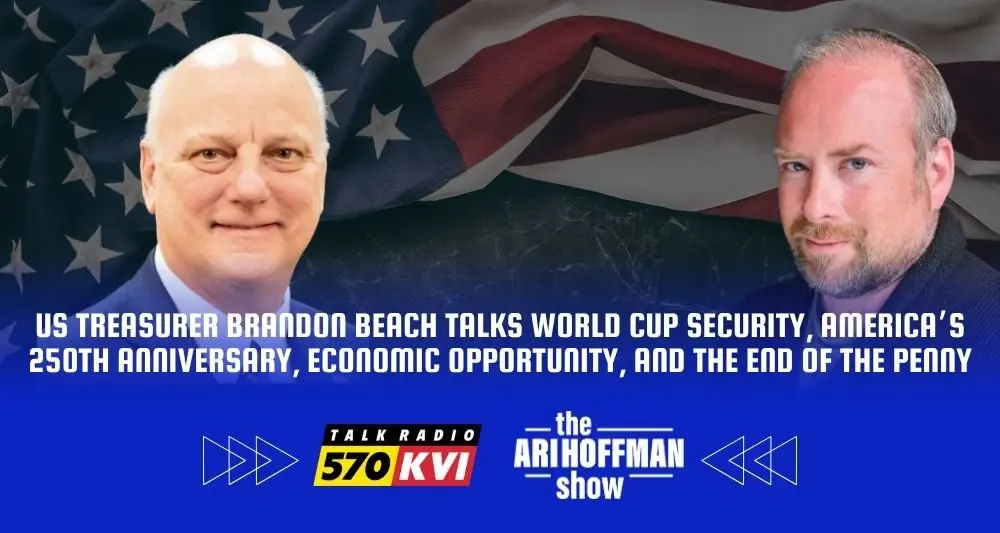
U.S. Treasurer Brandon Beach joined The Ari Hoffman Show on Talk Radio 570 KVI during his visit to Seattle, weighing in on everything from Seattle’s role in the 2026 FIFA World Cup to America’s upcoming 250th anniversary, and the historic decision to stop producing the penny.
World Cup Hosting: “Cities Need to Be Ready”
Beach addressed the growing national conversation surrounding Seattle’s preparedness for the 2026 FIFA World Cup, especially after President Trump suggested cities must demonstrate they can guarantee safety or risk losing matches.
Beach noted that hosting World Cup games is “like having three or four Super Bowls,” bringing enormous economic upside if cities take full advantage of the moment. Citing his experience during Atlanta’s 1996 Olympics, Beach said that global events can skyrocket development and visibility, “and if a city doesn’t capitalize on that opportunity, shame on them.”
He encouraged Seattle’s incoming leadership to recognize what’s at stake: “Every city hosting the World Cup should make sure they’re ready so they can showcase themselves and get future economic development.”
America’s 250th Anniversary: “A Chance to Celebrate Exceptionalism”
Beach said 2026 will be “a really great year,” marking the nation’s 250th birthday with large-scale commemorations and new releases from the U.S. Mint. He emphasized that the milestone is an opportunity to highlight “American exceptionalism, American pride, and American spirit.”
“We’ve got a great country,” Beach said. “Where else can you open a chicken restaurant with $40,000 and be worth $22 billion twenty-five years later? That only happens in America.”
Economic Opportunity and a “Golden Age Economy”
Beach praised the administration’s economic agenda, lowering energy costs, cutting regulation, and positioning the private sector to create jobs.
He argued that lowering energy costs is key to reducing the price of food, transportation, and consumer goods. “Capitalism works,” he said, recounting the rise of Cane’s Chicken founder Todd Graves as an example of what Americans can achieve when barriers are removed.
The goal, Beach explained, is what President Trump calls a “golden age economy,” powered by low taxes, fair trade, infrastructure investment, and reduced regulatory delays.
The End of the Penny: A Historic and Practical Shift
Beach confirmed that the U.S. Mint has officially stopped producing the penny after 232 years. The decision, he said, reflects both economics and common sense: “It was costing 3.79 cents to make one penny. It just didn’t make sense anymore.”
Though production has stopped, pennies will remain in circulation for years. “There are 300 billion pennies out there,” Beach said. “They’re still legal tender, we’re just not making new ones.”
The Treasury is also exploring changes to other coins, including a switch in metals for the nickel, which currently costs nearly 14 cents to produce.
At the same time, the Mint is leaning into growth opportunities. With record demand for commemorative coins, and major upcoming events like the 250th anniversary and the World Cup, Beach expects the Mint to exceed $1 billion in commemorative sales.
“We don’t want to just cut, we want to grow,” he said.
Listen to the full audio interview here:



